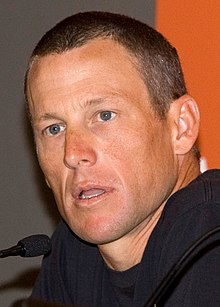
Back Lance Armstrong Afrikaans Lance Armstrong ALS لانس آرمسترونج Arabic لانس آرمسترونج ARZ Lance Armstrong AST لانس آرمسترانق AZB Лэнс Армстранг Byelorussian Ланс Армстранг BE-X-OLD Ланс Армстронг Bulgarian Lance Armstrong Breton
 Armstrong before the 2009 Tour Down Under | |||||||||||||||||||||
| Personal information | |||||||||||||||||||||
|---|---|---|---|---|---|---|---|---|---|---|---|---|---|---|---|---|---|---|---|---|---|
| Full name | Lance Edward Armstrong | ||||||||||||||||||||
| Nickname | Le Boss[1] Big Tex[2] | ||||||||||||||||||||
| Born | Lance Edward Gunderson September 18, 1971 Richardson, Texas, U.S. | ||||||||||||||||||||
| Height | 1.77 m (5 ft 9+1⁄2 in)[3] | ||||||||||||||||||||
| Weight | 75 kg (165 lb)[3] | ||||||||||||||||||||
| Team information | |||||||||||||||||||||
| Discipline | Road | ||||||||||||||||||||
| Role | Rider | ||||||||||||||||||||
| Rider type | All-rounder | ||||||||||||||||||||
| Amateur teams | |||||||||||||||||||||
| 1990–1991 | Subaru–Montgomery | ||||||||||||||||||||
| 1991 | US National Team | ||||||||||||||||||||
| Professional teams | |||||||||||||||||||||
| 1992–1996 | Motorola | ||||||||||||||||||||
| 1997 | Cofidis | ||||||||||||||||||||
| 1998–2005 | U.S. Postal Service | ||||||||||||||||||||
| 2009 | Astana | ||||||||||||||||||||
| 2010–2011 | Team RadioShack | ||||||||||||||||||||
| Major wins | |||||||||||||||||||||
Grand Tour
| |||||||||||||||||||||
Medal record
| |||||||||||||||||||||
Lance Edward Armstrong (né Gunderson; born September 18, 1971)[4] is an American former professional road racing cyclist. He achieved international fame for winning the Tour de France a record seven consecutive times from 1999 to 2005, but was stripped of his titles after an investigation into doping allegations, called the Lance Armstrong doping case, found he used performance-enhancing drugs over his career. Armstrong is currently banned for life from all sanctioned bicycling events.[5]
At age 16, Armstrong began competing as a triathlete and was a national sprint-course triathlon champion in 1989 and 1990. In 1992, he began his career as a professional cyclist with the Motorola team. Armstrong had success between 1993 and 1996 with the World Championship in 1993, the Clásica de San Sebastián in 1995, Tour DuPont in 1995 and 1996, and a handful of stage victories in Europe, including stage 8 of the 1993 Tour de France and stage 18 of the 1995 Tour de France. In 1996, he was diagnosed with a potentially fatal metastatic testicular cancer. After his recovery, Armstrong founded the Lance Armstrong Foundation (now the Livestrong Foundation) to assist other cancer survivors.
Returning to cycling in 1998, Armstrong was a member of the US Postal/Discovery team between 1998 and 2005 when he won his seven Tour de France titles. Armstrong retired from racing at the end of the 2005 Tour de France, but returned to competitive cycling with the Astana team in January 2009, finishing third in the 2009 Tour de France later that year. Between 2010 and 2011, he raced with Team Radio Shack, and retired for a second time in 2011.
Armstrong became the subject of doping allegations after winning the 1999 Tour de France. For years, he denied involvement in doping. In 2012, a United States Anti-Doping Agency (USADA) investigation concluded that Armstrong had used performance-enhancing drugs over the course of his career[6] and named him as the ringleader of "the most sophisticated, professionalized and successful doping program that sport has ever seen."[7] While maintaining his innocence, Armstrong chose not to contest the charges, citing the potential toll on his family.[8] He received a lifetime ban from all sports that follow the World Anti-Doping Code, ending his competitive cycling career.[9] The International Cycling Union (UCI) upheld USADA's decision[10] and decided that Armstrong's stripped wins would not be allocated to other riders.[N 1][11] In January 2013, he publicly admitted his involvement in doping. In April 2018, Armstrong settled a civil lawsuit with the United States Department of Justice and agreed to pay US$5 million to the U.S. government after whistleblower proceedings were commenced by Floyd Landis, a former team member.
- ^ Fotheringham, William (2011). Cyclopedia: It's All about the Bike. Chicago Review Press. p. 18. ISBN 978-1-56976-948-5.
- ^ Reilly, Rick (July 5, 2010). "Armstrong keeps passing tests". espn.go.com. Archived from the original on January 28, 2016. Retrieved May 12, 2013.
- ^ a b Cite error: The named reference
tdfwas invoked but never defined (see the help page). - ^ "Lance Armstrong Fast Facts". CNN. January 17, 2013. Archived from the original on June 7, 2019. Retrieved July 10, 2017.
- ^ Schrotenboer, Brent (September 7, 2016). "Lance Armstrong's ban is partially lifted". USA Today. Archived from the original on July 24, 2023. Retrieved July 24, 2023.
- ^ Cite error: The named reference
Lance Armstrongwas invoked but never defined (see the help page). - ^ "Lance Armstrong: USADA report labels him 'a serial cheat'". BBC News. October 11, 2012. Archived from the original on October 11, 2012. Retrieved November 10, 2012.
- ^ Cite error: The named reference
NYTdropsfightwas invoked but never defined (see the help page). - ^ "Lance Armstrong Receives Lifetime Ban And Disqualification Of Competitive Results For Doping Violations Stemming From His Involvement In The United States Postal Service Pro-Cycling Team Doping Conspiracy, USADA". Usada.org. August 24, 2012. Archived from the original on December 5, 2012. Retrieved November 10, 2012.
the UCI recognized a decision from the U.S. Anti-Doping Agency
- ^ Cite error: The named reference
BBC-UCIwas invoked but never defined (see the help page). - ^ a b "Press release: UCI takes decisive action in wake of Lance Armstrong affair". Union Cycliste Internationale. October 26, 2012. Archived from the original on August 26, 2013. Retrieved February 18, 2014.
- ^ Cite error: The named reference
auto1was invoked but never defined (see the help page).
Cite error: There are <ref group=N> tags on this page, but the references will not show without a {{reflist|group=N}} template (see the help page).
© MMXXIII Rich X Search. We shall prevail. All rights reserved. Rich X Search